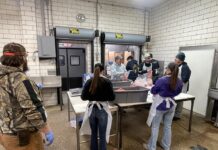COLUMBUS — Despite continual updates of products involved in the widespread peanut product recall, consumers may no longer be paying attention, according to a food safety expert at Ohio State University.
And of those who are, a substantial portion may ignore the warnings.
Neal Hooker is a food safety policy researcher with the Ohio Agricultural Research and Development Center and Ohio State University Extension and a visiting scholar at the Food Policy Institute at Rutgers University.
Salmonella outbreak
Hooker and others in the Rutgers group recently released a paper on public reaction to last summer’s Salmonella outbreak that was first associated with tomatoes and then shifted to chili and jalapeno peppers.
The telephone survey of 1,101 Americans in August and September 2008 revealed awareness of the problem was high, but specifics about the outbreak and recommended actions were often misunderstood or disregarded.
The report, Public Response to the Salmonella Saintpaul Outbreak of 2008, is available at http://foodpolicy.rutgers.edu/.
Number of parallels
Hooker, who is also an associate professor in Ohio State’s Department of Agricultural, Environmental and Development Economics, sees a number of parallels in the reaction to that outbreak and what is happening in the peanut-related recalls.
First, in both instances, the messages were complex and were sent piecemeal.
“Consumers rely heavily on television coverage for information like this, and they usually focus on the message only the first time, and possibly one subsequent time, before their attention drifts off,” Hooker said.
“As the lists of foods being recalled are updated day by day, I think it’s unlikely consumers would go back and keep checking them. A very small percentage actually determine if a product they’ve purchased is part of the recall.”
For example, in last summer’s outbreak, Hooker’s group found almost half of survey respondents were uncertain of the specific types of tomatoes considered unsafe.
Personalized recall service
Students working with Hooker are studying whether consumers would appreciate — and pay for — a personalized recall service based on their purchases, tracked through grocery stores’ discount cards.
Hooker calls the idea a “reverse 911 system” to warn consumers about recalled products they have purchased. It’s possible that such a personalized service could help consumers take recalls more seriously, he said.
That’s important because another finding in the Rutgers report noted a substantial minority of people who are aware of recalls often pay no attention.
Intentionally disregarded
In last summer’s outbreak, 11 percent of the survey respondents intentionally disregarded the Food and Drug Administration’s advice not to consume certain types of tomatoes, believing the risk was exaggerated or retailers would have already removed any of the risky product from store shelves.
Some of those respondents, 12 percent, said they simply made sure they washed or cooked the affected tomatoes before consuming them, even though the FDA warned washing tomatoes didn’t guarantee safety, and never offered guidance on how much cooking was necessary to kill the Salmonella bacteria.
Hooker, who has studied consumer perception of food safety since the 1990s, said messages about food recalls have always been difficult to communicate.
“They’re not like other public health messages because with food recalls, we want people to change their behaviors for only a short period of time, and then go back to their normal patterns,” he said.
Life and death
Understanding consumer reactions to recall messages can be a life and death proposition.
While many foodborne illnesses cause serious health problems primarily for those in high-risk groups (children, the elderly, pregnant women or people with chronic health conditions), some, such as botulism, can cause serious illness or death in anyone.
When a recall was issued for a brand of canned hot dog chili sauce in the summer of 2007 because of botulism concerns, Hooker said not all stores pulled the product from their shelves, and not all consumers heeded the warnings.
Last summer, 1,442 people were sickened in the Salmonella Saintpaul outbreak, with at least 286 hospitalized and possibly two deaths.
Peanut products
In the current outbreak, the Centers for Disease Control and Prevention have confirmed 529 people have been infected with Salmonella Typhimurium associated with peanut products from the Peanut Corporation of America’s Georgia plant, with 116 hospitalized.
Eight deaths may be associated with the outbreak.
In addition, research suggests the vast majority of people affected by foodborne illness never report it to authorities, with the assumption for each case of reported illness, an additional 39 people may have become ill.
Current recall
The current recall involves all peanuts and peanut products processed at the Blakely, Ga., facility since Jan. 1, 2007.
While the peanut butter and other products were not sold directly to consumers, peanut butter (in 5-pound or larger containers) were used in institutional settings, and potentially contaminated product was used as an ingredient in hundreds of different products, such as cookies, crackers, cereal, candy and ice cream.
Updated list
For more details on the current outbreak and an updated list of recalled products visit http://www.fda.gov.










